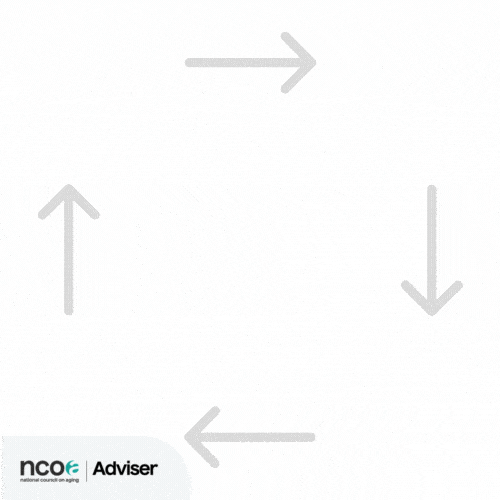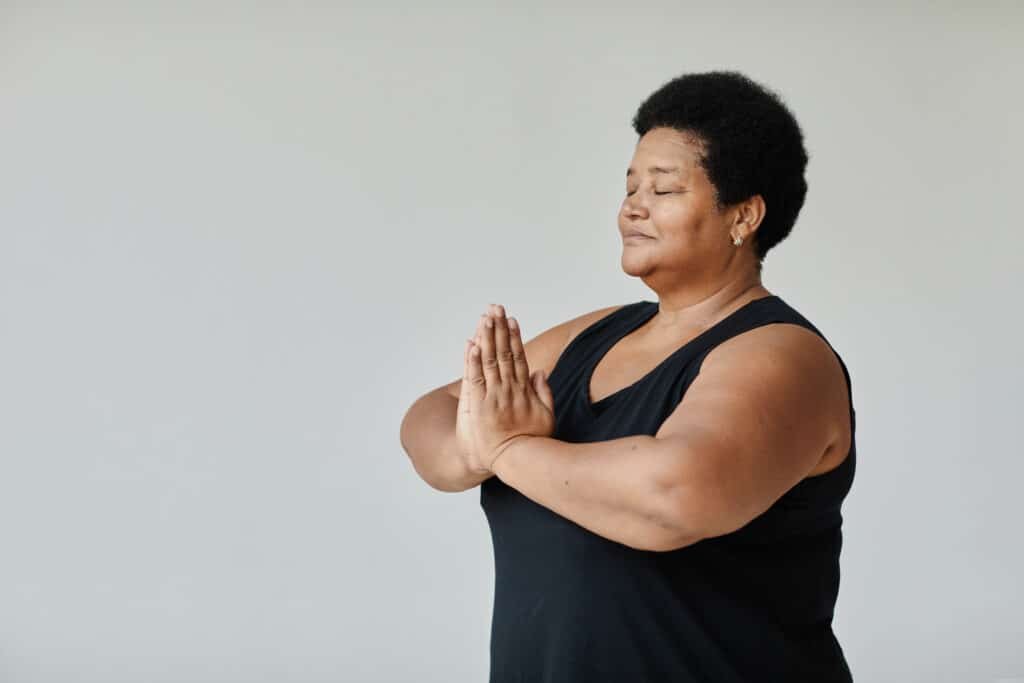Aug 04, 2023
Fact Checked
Meditation can lead to a better night’s sleep. Learn how meditation may improve your sleep apnea and easy ways to get started.
Key Takeaways
- Sleep apnea can impact mental well-being, energy, and long-term health.
- A meditation practice can help people with sleep apnea fall asleep more easily and have a better experience with their CPAP treatment.
- Meditation comes in many forms and from different traditions. Breathing exercises are an easy way to get started with meditation.
Sleep apnea, a condition where the airway becomes restricted or blocked during sleep, can affect your quality of sleep and, as a result, impact your quality of life. Poor-quality sleep affects physical health, mental health, daily activities, and long-term well-being. Meditation is a mindfulness practice that can benefit those with sleep apnea in many ways. To learn more about how it can help, we interviewed sleep and mental health experts and examined the research on the topic.

If you or your partner frequently snores, gasps during sleep, or experiences daytime sleepiness, consider speaking to a health care provider about sleep apnea.
Sleep apnea and the mind
Sleep apnea has been associated with several mental health conditions. One study found that U.S. adults with sleep apnea were about three times more likely to have depression and almost four times more likely to have anxiety.
Valerie Cacho, MD, a sleep specialist in Ewa Beach, Hawaii, explained that sleep disorders and mental health have a two-way relationship. Cacho shared that sleep deprivation caused by untreated obstructive sleep apnea (OSA) can lead to low energy, depression, anxiety, and stress. Early studies have even shown that sleep deprivation from untreated OSA can increase the risks of developing Alzheimer’s disease.
On the other hand, poor mental health can contribute to insomnia ⓘDifficulty falling asleep or staying asleep. and other sleep disorders. People with symptoms of anxiety and depression may find it difficult to relax, fall asleep, or stay asleep.

If you or someone you care for is in need of mental health support, resources are available to help:
- Call or text 988 or 988lifeline.org for immediate crisis support.
- Visit FindSupport.gov to find mental health care, support, and to learn about treatment options.
- Call 800-662-HELP (4357) for the Substance Abuse and Mental Health Services Administration (SAMHSA)’s National Helpline for treatment and referral information.
Many studies have confirmed that nightly continuous positive airway pressure (CPAP) therapy improves sleep quality and quality of life in people with OSA. But sleeping with a mask on and a machine beside you can be an adjustment. People with OSA who report feeling claustrophobic with a CPAP mask are less likely to stick to regular treatment. Meditation can help CPAP users manage these feelings of anxiety and claustrophobia.
Why meditation?
Meditation is the practice of integrating the mind and the body to increase self-awareness, soothe nervousness, and improve various aspects of well-being.
There are a few key ways that meditation can help support people with sleep apnea.

Types of Meditation
Meditation isn’t just sitting with your eyes closed. Various types of meditation incorporate sound, scent, spiritual components, mental and physical techniques, or a combination of these elements.
For example, yoga, Qigong, and Tai Chi are action-based meditative practices rooted in Indian and East Asian traditions that increase awareness within the body through movement patterns.
Calms the mind
Meditating can help you feel calmer, fall asleep faster, and improve your quality of sleep. Specifically, mindfulness meditation—focusing on being fully present in the current moment—can improve symptoms of stress, anxiety, depression, and post-traumatic stress disorder (PTSD).
Builds mind-body awareness
Cacho explained that meditation, especially mindfulness-based meditation, can help people understand how CPAP treatment benefits their sleep, mood, and energy. Because of this increased self-awareness, meditation can help people with OSA continue their treatment compared to patients who may not pay attention to the benefits of treatment.
As mentioned, sleeping with a CPAP mask may not initially feel comfortable for some. Studies have found that veterans diagnosed with PTSD, for example, are less likely to adhere to CPAP treatment than those without PTSD. Cacho shared that having an awareness of the body, mind, and thoughts that come up while using a CPAP machine can allow the person to feel in control of their experience. Building self-awareness through meditation can give people the ability to shift their mindset, work through the discomfort of wearing a mask, and allow them to continue CPAP treatment regularly.
Benefits overall well-being
Meditation practices benefit many aspects of health that may be associated with OSA. Besides sleep, mindfulness-based meditation can help manage pain, high blood pressure, substance use disorder, and eating behaviors related to anxiety, depression, or eating disorders.
Table 1 How meditation benefits health conditions related to sleep apnea
|
Health condition |
Relationship to sleep apnea |
How meditation helps |
|---|---|---|
| Chronic pain | People with chronic pain tend to have OSA, especially if taking opioid medications. | Can reduce the experience of pain and increase pain tolerance |
| High blood pressure | OSA can cause or worsen high blood pressure. | Can help lower blood pressure |
| Diabetes (Type II) | OSA can increase the risk of developing diabetes. Diabetes can increase the risk of developing OSA. | Can help control blood sugar levels |
| Substance use disorder | Consuming alcohol increases the risk of developing OSA. | Can help treat and prevent relapse of alcohol use disorder |
| Higher weight | Higher weight increases the risk of developing OSA. | Can help improve eating behaviors to manage weight; can help with mental health concerns such as anxiety and depression that may contribute to or co-exist with higher weight |
Sources:
Reduces daytime tiredness
Some research indicates that specific breathing techniques improve symptoms of OSA. For example, a small study found that pursed lip breathing and diaphragmatic breathing exercises significantly reduced daytime tiredness in people with OSA.
How to incorporate meditation into your sleep apnea self-care
Meditation best practices for beginners
Here are some things to keep in mind when adding meditation to your sleep apnea self-care routine:
- Meditation is a practice. That is, it’s an activity that you learn, get better at, and regularly return to. You may start with guided meditations and move into less structured sessions later in your practice. If motivation is an issue, getting started with an instructor or a group might help keep you accountable.
- Don’t overcomplicate things. Starting a new habit requires patience and focus. Start with setting a time, creating a space, and choosing one type of meditation. Then, you can build on your practice as you become comfortable with it.
- Meditation is highly individualized. You can choose from many meditative practices with religious, spiritual, movement, or musical components. As Cacho said, “The best type of meditation is the one you do.”
How to meditate during the day
Incorporate meditation into your routine to encourage a grounded mindset throughout the day. Consider the following for daytime meditation practices:
- Meditating in the morning can help you set your intentions or start the day with a calm mindset.
- Meditating before or after a meal can be a good way to make it a routine. In addition, mindful eating incorporates meditation and can help reduce behaviors like binge eating.
- Scheduled breaks throughout the day can give you time to meditate.
- Set up a meditation space away from your phone, computer, or TV to avoid distractions during your session.
- Movement-based meditation can be a way to stay active during the day, which can also help you sleep better at night.
How to meditate at night
Meditation at night can help you wind down. Here’s what we recommend for nighttime meditation:
- Include meditation in your bedtime routine, just like dimming lights, brushing your teeth, and preparing your bedroom.
- Mindfulness, breathing, body scan, or guided meditations are relaxing and can help you prepare for sleep.
- If you practice a movement-based meditation like yoga, consider “restorative” or “slow” classes to encourage relaxation before bedtime.
- Practice good sleep hygiene during your nighttime meditation: use dim lighting and avoid large meals, caffeine, and alcohol before bedtime. Avoid using electronics in the bedroom unless it’s to play meditation audio.
- If you use an app or recording during your session, look for a timer function so it turns off automatically after you fall asleep.
Simple breathing practices
Breathing meditations follow specific breathing patterns to bring awareness to your body. You can combine breathing meditations with imagery, sound, or movement for more advanced practices. Breathwork sessions can be as short as five minutes long.
These two simple breathing techniques have been found to improve mood and decrease anxiety with daily practice. All you need is a comfortable and quiet place to begin.
Basic slow breathing


- Slowly inhale, filling your belly and chest with air for two to three seconds.
- Empty the air with a slow, smooth exhale for twice as long, for four to six seconds.
- Repeat for the duration of your session.
Box breathing


- Slowly inhale for three to four seconds.
- Hold your breath for the same amount of time, three to four seconds.
- Slowly exhale for three to four seconds.
- Hold your breath again for three to four seconds.
- Repeat for the duration of your session.
Meditation books and CDs
Books and CDs are a good way to keep screens out of your meditation routine. Popular mindfulness meditation authors include Jon Kabat-Zinn, Thich Nhat Hanh, Kristin Neff, Jay Shetty, and Jack Kornfield.
You can buy meditation books, CDs, and audiobooks from your local bookstore or borrow them from your library.
Online resources
Mobile apps
Here are some popular apps ⓘAn application that can be downloaded onto a mobile smart device such as a smartphone or a tablet. with meditation and sleep-supportive resources:
- Insight Timer is a free app with a meditation timer, audio and video, yoga classes, Qigong classes, and live classes. Its premium membership starts at $59.99 per year and has a free trial if you want access to offline meditations and courses. The app is available from Google Play Store and Apple Store.
- PTSD Coach is an app created for veterans with PTSD by the U.S. Department of Veterans Affairs (VA) National Center for PTSD, but you don’t have to be a veteran or diagnosed with PTSD to use it. The app has meditation resources, learning resources, a symptom tracker, and ways to connect with a mental health provider. It’s free and available from the Google Play Store and Apple Store. PTSD Coach Online is the web browser-based version.
- Calm is recommended by the sleep and mental health experts we interviewed. It has free and paid features. The free version has timed meditations, breathing exercises, and a selection of background music for meditation. The premium version has a free trial and starts at $69.99 per year. Calm is available from Google Play Store and Apple Store.
- Headspace is a subscription-based meditation app starting at $69.99 per year. The app has meditation audio and video for sleep, stress, and mindfulness. It has a free trial and is available from Google Play Store and Apple Store.
Online meditation audio
The Greater Good Science Center website from the University of California, Berkeley, offers a wide range of free meditation practices. Each meditation has written instructions on setting up and practicing the meditation, along with audio to guide you through it.
Lauren Masopust, a licensed marriage and family therapist in Roseville, California, recommended the free meditation resources from the University of California Los Angeles (UCLA) Mindful Awareness Research Center (MARC). MARC has audio and transcripts for guided meditations, available in 18 languages.
Online meditation videos
You can search for a variety of free meditation videos on YouTube. In addition to guided meditation videos, you can opt for relaxing background sounds or music to do your own meditation practice. Sleep experts like Cacho may have guided meditation videos online specifically for sleep. Headspace and Calm also have YouTube channels with meditation videos.
Online meditation groups
Starting a new habit with a community can make it easier to keep a routine. Meditate Together is a group that offers online video meditations through Zoom, 24 hours a day, Monday through Friday. Each drop-in session is 30 minutes long and free to join.
Insight Timer has community groups where users can find and interact with others interested in the same meditation practices.
Local resources
Check your local libraries, recreation centers, or community centers to see if they have meditation classes or groups.
A local National Alliance on Mental Illness (NAMI) affiliate may offer free mental health support and education programs. You can find a local NAMI affiliate in the following ways:
- Visit the website https://www.nami.org/findsupport
- Call the NAMI helpline at 800-950-6264
- Text “HelpLine” to 62640
Bottom line
Poor quality sleep from untreated sleep apnea can impact your mood, mental state, and long-term health. Meditation, a mindfulness practice that can improve the health of your body and mind, can be a helpful tool to manage sleep apnea.
If someone with sleep apnea doesn’t use their CPAP machine nightly, they won’t receive the benefits of regular treatment. Meditation can help people adjust their mindset and use their CPAP machine more comfortably. Combining regular meditation and CPAP use can help people with OSA improve many aspects of their physical and mental health.
Have questions about this review? Email us at reviewsteam@ncoa.org.
Sources
- Walia HK, et al. Impact of Sleep-Disordered Breathing Treatment on Quality of Life Measures in a Large Clinic-Based Cohort. Journal of Clinical Sleep Medicine. Nov. 15, 2017. Found on the internet at https://jcsm.aasm.org/doi/10.5664/jcsm.6792
- National Heart, Lung, and Blood Institute. How Sleep Affects Your Health. Found on the internet at https://www.nhlbi.nih.gov/health/sleep-deprivation/health-effects
- Kaufmann CN, et al. Sleep Apnea, Psychopathology, and Mental Health Care. Sleep Health. August 2017. Found on the internet at https://www.sciencedirect.com/science/article/abs/pii/S2352721817300499
- Andrade A, et al. The Relationship Between Obstructive Sleep Apnea and Alzheimer’s Disease. Journal of Alzheimer’s Disease. June 12, 2018. Found on the internet at https://www.ncbi.nlm.nih.gov/pmc/articles/PMC6542637/
- Anxiety and Depression Association of America. Sleep Disorders. Found on the internet at https://adaa.org/understanding-anxiety/related-illnesses/sleep-disorders
- Patil SP, et al. Treatment of Adult Obstructive Sleep Apnea With Positive Airway Pressure: An American Academy of Sleep Medicine Systematic Review, Meta-Analysis, and GRADE Assessment. Journal of Clinical Sleep Medicine. Feb. 15, 2019. Found on the internet at https://jcsm.aasm.org/doi/10.5664/jcsm.7638
- Weaver TE, et al. Adherence to Continuous Positive Airway Pressure Treatment for Obstructive Sleep Apnea: Implications for Future Interventions. Indian Journal of Medical Research. February 2010. Found on the internet at https://www.ncbi.nlm.nih.gov/pmc/articles/PMC2972705/
- National Center for Complementary and Integrative Health. Meditation and Mindfulness: What You Need to Know. Found on the internet at https://www.nccih.nih.gov/health/meditation-and-mindfulness-what-you-need-to-know
- Gong H, et al. Mindfulness Meditation for Insomnia: A Meta-Analysis of Randomized Controlled Trials. Journal of Psychosomatic Research. October 2016. Found on the internet at https://www.sciencedirect.com/science/article/abs/pii/S0022399916303579
- Collen JF, et al. The Impact of Posttraumatic Stress Disorder on CPAP Adherence in Patients with Obstructive Sleep Apnea. Journal of Clinical Sleep Medicine. Dec. 15, 2012. Found on the internet at https://jcsm.aasm.org/doi/10.5664/jcsm.2260
- Nikolaou K, et al. Obstructive Sleep Apnea and Pain. Current Sleep Medicine Reports. July 9, 2019. Found on the internet at https://link.springer.com/article/10.1007/s40675-019-00143-0
- Gleeson M, McNicholas WT. Bidirectional Relationships of Comorbidity With Obstructive Sleep Apnoea. European Respiratory Review. June 2022. Found on the internet at https://err.ersjournals.com/content/31/164/210256
- Sinha SS, et al. Effect of Six Months of Meditation on Blood Sugar, Glycosylated Hemoglobin, and Insulin Levels in Patients of Coronary Artery Disease. International Journal of Yoga. May-August 2018. Found on the internet at https://www.ncbi.nlm.nih.gov/pmc/articles/PMC5934947/
- Simou E, et al. Alcohol and the Risk of Sleep Apnoea: A Systematic Review and Meta-Analysis. Sleep Medicine. February 2018. Found on the internet at https://www.sciencedirect.com/science/article/pii/S1389945717315988
- St-Onge M, Tasali E. Weight Loss is Integral to Obstructive Sleep Apnea Management. Ten-Year Follow-Up in Sleep AHEAD. American Journal of Respiratory and Critical Care Medicine. Jan. 15, 2021. Found on the internet at https://www.atsjournals.org/doi/10.1164/rccm.202007-2906ED
- Serçe S, et al. The Effect of Breathing Exercise on Daytime Sleepiness and Fatigue Among Patients with Obstructive Sleep Apnea Syndrome. Journal of Breath Research. Aug. 25, 2022. Found on the internet at https://iopscience.iop.org/article/10.1088/1752-7163/ac894d
- Harvard T.H. Chan School of Public Health. Mindful Eating. Found on the internet at https://www.hsph.harvard.edu/nutritionsource/mindful-eating/
- Balban MY, et al. Brief Structured Respiration Practices Enhance Mood and Reduce Physiological Arousal. Cell Reports Medicine. Jan. 17, 2023. Found on the internet at https://www.cell.com/cell-reports-medicine/fulltext/S2666-3791(22)00474-8

